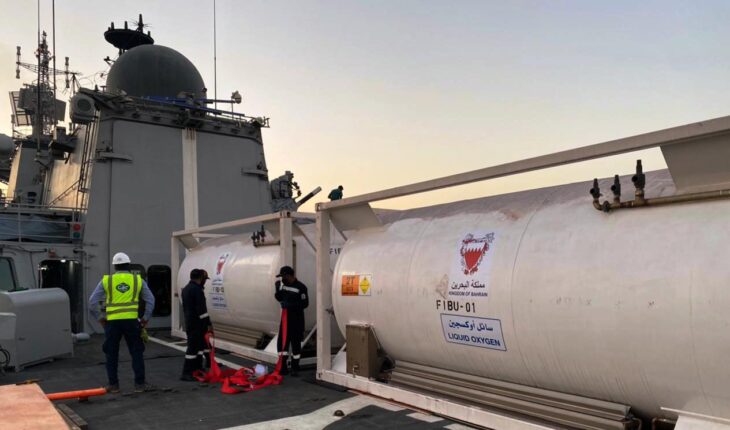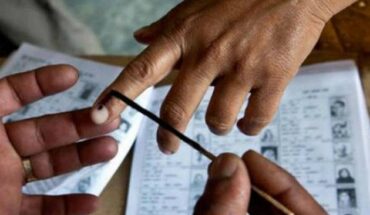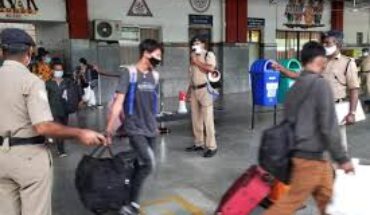By Dominick Rodrigues
Mumbai : The Indian Navy, as part of India’s battle against Covid-19 and also part of operation ‘Samudra Setu II’, has deployed seven Indian Naval ships — Kolkata, Kochi, Talwar, Tabar, Trikand, Jalashwa and Airavat — for shipment of liquid medical oxygen-filled cryogenic containers and associated medical equipment from various countries.
INS Kolkata and INS Talwar, mission deployed in Persian Gulf, were the first batch of ships that were immediately diverted for the task and entered port of Manama, Bahrain on 30 Apr 21. INS Talwar, with 40 MT Liquid Medical Oxygen (LMO) embarked, headed back home, while INS Kolkata had proceeded to Doha, Qatar for embarking medical supplies and subsequently to Kuwait for embarking Liquid Oxygen tanks.
Similarly, on the Eastern seaboard, INS Airavat too was diverted for the task, while INS Jalashwa, the LPD which played a key role during op Samudra Setu last year was pulled out of maintenance, readied and sailed out to augment the effort.
INS Airavat was scheduled to enter Singapore for embarking Liquid oxygen tanks and INS Jalashwa kept on standby in the region to embark medical stores at short notice.
The second batch of ships comprising Kochi, Trikand and Tabar mission deployed in Arabian sea were also diverted to join the national effort. From the Southern Naval Command, the Landing Ship Tank INS Shardul was readied to join the Operation within 48 hours.
The Indian Navy also has the surge capability to deploy more ships when the need arises to further nation’s fight against COVID-19. It is pertinent that the ships are combat-ready and capable of meeting any contingency in keeping with the attributes of versatility of sea power.
It may be recalled that Operation Samudra Setu was launched last year by the Navy and around 4000 Indian citizens — stranded in neighbouring countries amidst COVID 19 outbreak– were successfully repatriated back to India.
Meanwhile, the Indian Coast Guard, in yet another successful search and rescue operation at sea, rescued missing Tamil Nadu fishing boat ‘Mercedes’ in a massive search operation launched since April 24, 2021 at a distance of about 1,100 kms (590 miles) from Goa.
The 11 crew-manned fishing boat had sailed for deep sea fishing West of Kerala on April 06, 2021 for 30 days voyage from Thengapattanam Fishing harbour in Tamil Nadu. On April 24, 2021, the Tamil Nadu Fisheries authorities informed about sighting of debris by other fishing boats operating in the area — presuming ‘Mercedes’ to be sunk.
The Maritime Rescue Co-ordination Center (MRCC) of Indian Coast Guard at Mumbai activated International Safety Net (ISN) to alert merchant vessels transiting near the reported position to lookout for the missing boat. Simultaneously, ICGS Samudra Prahari on deployment was diverted for search, while MRCC (Mumbai) coordinated with merchant vessel Maersk Horsburgh to join the search operation along with fishing boats operating in the area.
As the reported position was located in Pakistan Search and Rescue Region, MRCC Karachi was also requested for assistance as per International Marine Organisation (IMO) norms in vogue. Considering the distance from mainland, Indian Navy was requested for launch of Long-Range Maritime Patrol aircraft. It was learnt that the fishing boat was not carrying AIS or any other transponder which could have assisted in early locating of the boat by the search units.
After four days of continuous search amidst challenges of distance from mainland and weather, the missing boat was located around 370 kms (200 miles) from Lakshadweep Islands. ICG Dornier aircraft located and corroborated presence of the fishing boat on the morning of May 01, 2021. The MRCC (Mumbai) established communication with the fishing boat crew on their satellite phone and ascertained the crew to be safe. ICG ship Vikram on deployment off Lakshadweep located the boat on April 29, 2021 around 25 NM from Suheli Par, Lakshadweep Islands and escorted it to its base port at Thengapattanam fishing harbour.
The Indian Coast Guard, as the national maritime search and rescue coordinator, has saved around 10,000 lives over 3,400 missions averaging almost one life saved per two days. Indian Coast Guard has been advocating fitment of AIS, Distress Alert Transponders and Long-Range two-way communication mechanism for enhancing safety of fishers proceeding for deep sea fishing.






